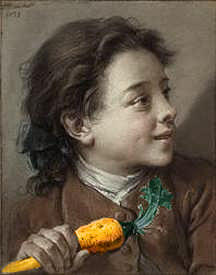1.31.2007
I was inspired to write this post in response to the interesting article on "Fighting Terror with Paint Brushes" by Craig Roland over at the Art Teacher's Guide to the Internet (my other favorite art education blog). Roland writes about an activity on the PBS Frontline website entitled Protest Violence With Painting. This lesson encourages students to examine and discuss an artistic act of dissent in which Sri Lankan artists have taken to the streets to protest the daily violence with which they live. At the end of his post, he poses these questions:Although I feel this activity offers a thoughtful and sensitive way to approach the issue of violence with students, I wonder if high school art teachers in this country have the freedom to do such activities in their classrooms? And, if they do, would they actually teach a lesson like this to their students?
Many of our students have to deal with the concept of violence in various ways. Sometimes at home, sometimes on the street, sometimes at school. As Roland points out, one of the most obvious examples today is in making sense out of our current war in Iraq.
What good are we doing for our students if we ignore these issues? Art has always dealt with controversial issues. Art has always been revolutionary. These revolutions have come in many different forms. James Mac Neil Whistler revolutionized the art world with the simple act of introducing abstraction into his work. In protest against Napoleon's occupation of Spain Francisco Goya painted The Third of May through which he meant to "perpetuate by the means of his brush the most notable and heroic actions of our glorious insurrection against the Tyrant of Europe" (see Wikipedia entry). Dada challenged the incomprehensible horror of war by creating artwork that was equally incomprehensible.
These revolutions have come in many different forms. James Mac Neil Whistler revolutionized the art world with the simple act of introducing abstraction into his work. In protest against Napoleon's occupation of Spain Francisco Goya painted The Third of May through which he meant to "perpetuate by the means of his brush the most notable and heroic actions of our glorious insurrection against the Tyrant of Europe" (see Wikipedia entry). Dada challenged the incomprehensible horror of war by creating artwork that was equally incomprehensible.
I would go so far as to say that art must address these issues. To do otherwise would both require us to whitewash art history and ignore the fundamental question of why we make art.
Teaching art is an act of revolution.
At its most fundamental level, revolutionary thought can be found in the simple act of teaching our students to think for themselves, formulate their own opinions, and use their art as a means to communicate these ideas. Perhaps we take it for granted, but thinking outside the box can be, and has been, a revolutionary concept. Currently, I'm teaching at an American School in China. As an American School, we enjoy a great deal of freedom that is not the norm here, but it is more apparent that it is something that we should not take for granted. Walking down to the art district in downtown Shanghai, you see a lot of innovative and beautiful artwork, but you don't see anything that challenges the status quo. In the US, artists have the freedom to challenge, and teachers do have the freedom to teach about social justice. The art classroom provides a unique environment for participating in meaningful and engaging activities that challenge the way we think and the way we live.
For example, in July of 2005 I posted about The Protest of the Heritage School. Students of my friend, art teacher Kim Lane, created massive paper mache figures for a public demonstration against the unexplained detention of their classmate, Adama Bah. They managed to bring a lot of attention to her cause, and although no explanation was ever given, the government eventually released her.
I'm certainly not suggesting that every lesson plan should have "make the world a better place" as the 'objective'. I think we can set much more reasonable goals for ourselves simply by continuing to help our students see the world in new ways. Sometimes it will be something as simple as attempting a different kind of brush stroke, and sometimes it will be a theme or concept that will push students to make a difference in their own lives and the lives of those around them.
...and it should remind us of the relationship between freedom and the consciousness of possibility, between freedom and the imagination - the ability to make present what is absent, to summon up a condition that is not yet.
-Maxine Greene, The Dialectic of Freedom
Tags: Activism, Art History, Lesson Plans, Pedagogy, street art
1 Comment:
-
- Anonymous said...
11:28 AMA thought provoking post. I enjoyed reading this one.














